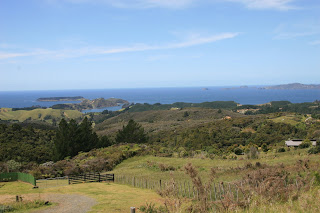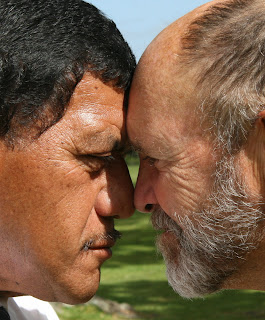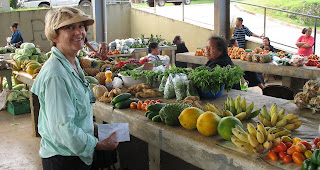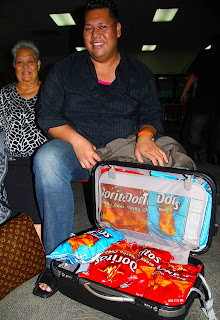
It is hard to be a gracious tourist when you are from California. Beautiful beaches - we've got 'em. Big trees - ours are bigger. Parks - heard of Yosemite? Waterfalls - ditto. Mountains - Sierras in Spanish. Deserts - yeah lots. It's the same for rivers, cities, bays, bridges, farmland, wine, wildlife, nightlife etc etc. So it is often the things the locals take for granted that impress us most about their homeland. So it would be of New Zealand.
We finally get to Auckland at 2AM, a day late and lots of dollars short. We gratefully find the "
iSite" tourist info kiosk still manned. (These are all over the country ready to help the traveler.) and they quickly find us a few winks at an airport motel near a car hire. That would never happen at
SFO.
We pick up a "Rent-a-Dent" and hit the road early to catch up to our
pre-paid lodgings. Again we learn the lesson that it is far better to wing it than try to fit into a plan already made beforehand. What was to have been a casual few days of short drives between little towns and little B&
Bs in this far north of New Zealand, starts out with "make it up on the road" tensions - while driving on the wrong side of that road.
Thankfully, big city traffic out of Auckland provides cars for me to follow and remind me to stay on the left side of
centerline. Once in the countryside, cars are few and it is a constant effort to keep left while remembering to signal with the right hand lever and stop
wiping the windshield at every turn. Jean wisely insisted on an automatic shift - eliminating the left-hand gear knob's additional confusion. The roads are narrow, hilly and very well signed - but I am nervous.
Most small intersections here are controlled by round-a-bouts. You drive into a circle where everyone simply keeps moving around to the left while yielding to the cars on the right. This is a marvel of practical efficiency - no stop signs, no idling at empty red lights or waiting for green arrows. As a Darwinian bonus - this system would probably cull some of our drivers - the ones who can't figure out who goes next at a 4 way stop. Taking them out before they give their kids driving lessons.

This area is called
Northland, north of the population centers around Auckland. It is wide-open, green, and dotted with cattle - both meat and dairy. The sheep industry is on hard times and the cow is now king - at least in these parts.
Northland reminds me of rural northern California's winding roads and rugged coast - but with fewer people, less trash, more parrots, roadkill possums - and the occasional roadside pub or teashop.
NZ seems to house a great number of people from somewhere else with a tale to tell. We meet Kiwis that were Slavs, Croats,
Chileans, and my first
Abkhazian. Example is a Dutchman, raised in South America who now owns our B&B, a 150 year-old house built for the postmaster of a lumber
boomtown. The big trees here are long gone, but are fondly memorialized by a local museum - and ringing in my mind the Joni Michelle's song "… cut all the trees and put 'em in a tree museum."
A little ferry carries us across
Hokianga harbor to continue up the west coast to a stop at the south end of 90 Mile Beach - the village of
Ahipara. Like most locales, the Maori names reflect the integration of the original Polynesian and the later English culture into everyday life. There are no hyphenated New
Zealanders, everyone here is equally a Kiwi, mixed marriages are common, and every drop of Maori blood is claimed with pride - even by little blond schoolgirls. "
Kia ora" (hello) can be used by everyone here, like aloha is in Hawaii.
And friendly is far too mild a term for the people we've met. From snack bars, petrol stations and ferry drivers - all have time to chat and smile. A local we met days ago sees us and doesn't just nod or wave, he pulls over and gets out of his car to greet us. He was a professional caddy, knows Tiger and all the others. He built a tee box on his lawn and drops everything when local kids come by to learn the game and smack used balls out into the surf. His name is "Irish" and he was - but now is all Kiwi. Our hosts here are sailors from the US who landed years ago and never left. They refer to NZ as "our country" now.


Walter, a local Maori lad, guides us on a long quad cycle ride into wild lands down the coast. No contracts, insurance forms, warning labels or California liability suits - just hop on and fire it up. For hours we see no other people and little sign of others having passed before. Much of this lightly populated country is sill free of humans.

As we hug the shore at low tide we find their little green abalone are out of our reach - but not the big green mussels. We pry a bag full off the rocks to add to some good local wine waiting for dinner. It is late when we turn homeward and so he says "wait 'til tomorrow to pay - I'll drop by whenever you like." Remarkable.
While riding back into the village I pause to ask a surfer on the beach if he "got any waves today?" An hour later he drives up next to me on the street, gets out to introduce himself and asks if I would "fancy a surf" in the morning. No board no wetsuit, no worries - he has spares. In 45+ years of surfing California, nothing like that ever happened to me.
I do "fancy a surf" - and it is a sunrise 4 wheel drive to Shipwreck Bay - made famous by a scene in the 60's surf flick Endless Summer - where they had to re-load the camera to film all of one ride on the absurdly long waves found here.

As I sit waiting for another wave I see the huge tree-ferns towering over the cliffs, the waterfalls pouring from Maori sacred caves, and the ocean under my feet is a pristine blue. No noise from
hiways or planes pollutes my ears. Andrew, my new Kiwi friend and I are the only ones out in the water all morning. They may take all this for granted, but I know I am not in California anymore.
-
Surfin' Stew





